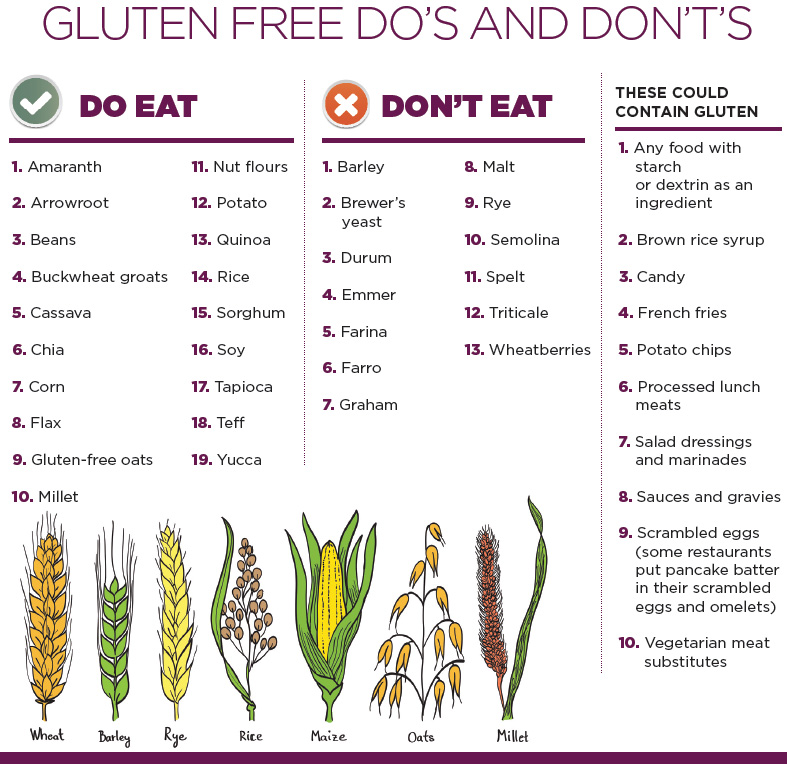by Densie Webb, Ph.D., R.D., Environmental Nutrition
You may have noticed that gluten-free options are everywhere these days. It’s easy to find just about any food that involves grains, including breads, cookies, breakfast cereals, and snack bars in gluten-free form. So, should you go gluten-free? The odds are you don’t have to. But if you suspect gluten may be bothering you, here’s what you need to know before taking the gluten-free plunge.
CELIAC DISEASE VS. GLUTEN SENSITIVITY
Celiac disease is a serious genetic autoimmune disease in which the body reacts to the ingestion of gluten, a sticky protein found in wheat, barley and rye, by damaging the small intestine and interfering with the absorption of important nutrients. It is diagnosed by a blood test for gluten antibodies and a small biopsy of intestinal tissue. It affects less than one percent of the population.
If tests for celiac disease are negative and a wheat allergy has been ruled out, but symptoms continue, gluten sensitivity (non-celiac gluten sensitivity) may be the culprit. NCGS, a much less severe reaction to gluten, is estimated to affect as much as six percent of the population – still a minority, but six times more common than celiac disease.
According to Rachel Begun, M.S., R.D.N., C.D.N., food and nutrition consultant and a gluten-related disorders expert, “There is no scientifically proven test for diagnosing NCGS; instead, it is a diagnosis of exclusion. Once celiac and other conditions have been ruled out and symptoms improve when gluten is eliminated from your diet, then NCGS is diagnosed. While not as damaging as celiac disease, the symptoms of NCGS can be just as bothersome.

THE GLUTEN SENSITIVITY RX
There’s no pill or shot to treat gluten sensitivity. Shelly Asplin, MA, RD, LMNT, who herself requires a gluten-free diet, recommends a strict gluten-free diet for people with NCGS.
“Watch for wheat, barley, rye and their derivatives on all products and buy grains, seeds and flours labeled ‘gluten-free,’ ” Asplin notes. As with celiac disease, a gluten-free diet is required for life.
GLUTEN-FREE LABELS
Beginning Aug. 5, 2014, the U.S. Food and Drug Administration mandated strict criteria on foods and supplements that are labeled “gluten-free.” That means that any product labeled gluten-free may contain no more than the smallest amount (20 ppm) of gluten believed to be safe for the majority of people with celiac. That goes for people with NCGS, as well.
Keep in mind, however, that the USDA, which regulates meat and poultry, does not have gluten-labeling requirements. While meat and poultry are naturally gluten-free, cross contamination during processing can occur.
In addition, gluten-free labeling is not required on restaurant menus and, as with meat and poultry, cross contamination of gluten-containing foods with foods that are otherwise gluten-free makes eating out a risky proposition.
HOW DO YOU KNOW IF YOU’RE GLUTEN SENSITIVE?
“People with NCGS are more likely to experience extra-intestinal symptoms than gastrointestinal symptoms, but it varies from person to person,” says Rachel Begun, M.S., R.D.N., C.D.N. Common symptoms include fatigue, headaches, bloating, foggy brain, and sometimes tingling and numbness, but these are symptoms that could be caused by any number of conditions, making NCGS difficult to diagnose.
For more information on gluten intolerance and gluten-free products, go to www.celiac.org.









